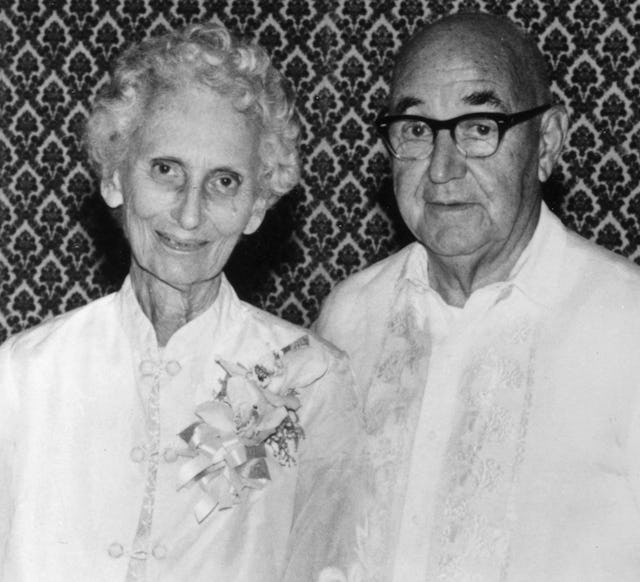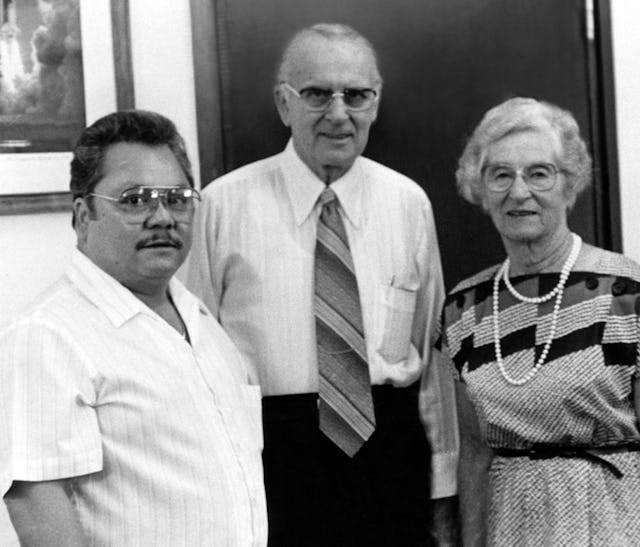Spiritual legacy now paying dividends
HAGATNA, Guam — Cynthia and Edgar Olson initially won fame on this Pacific Island for introducing "Swedish pancakes" but their enduring legacy is a contribution far more precious.
The couple, originally from Delaware in the United States, brought the teachings of Baha'u'llah here, and from that foundation the Baha'i Faith has since spread across the four inhabited islands of the archipelago of the Mariana Islands.
Some three years after their arrival the Olsons opened a Swedish pancake house, which became so popular that families drove from the far corners of the island to taste the exotic concoctions.
The building later functioned as a Baha'i center and it was from there that the plans to firmly establish the Faith were made.
Today the community includes seven local spiritual assemblies, and is experiencing a surge in enrolments as its devotional meetings, children's classes, and study circles attract attendance from the wider community.
The dramatic story of the Olsons was recounted on 2 May 2004 at Mrs. Olsons' graveside, in a ceremony marking the 50th anniversary of the arrival of the Faith in the Mariana Islands.
The Olsons were unlikely pioneers -- a journalist and storekeeper, both middle-aged: the thin, frail Cynthia and the burly, balding Edgar -- and they almost didn't make it by the target date of 2 May 1954.
As part of a decade-long (1953-1963), highly successful strategy to spread the Faith around the world, the then head of the Faith, Shoghi Effendi, had set that date as the goal for Baha'is to arrive in their place of service. This act usually involved, as it did with the Olsons, Baha'is voluntarily leaving their country to settle in one where there were no Baha'is.
At the time of the Olsons' arrival, the Mariana Islands were still a military area, controlled exclusively by the US Navy. Even short-term visitors needed special security clearance and a very good reason for coming -- a Navy-approved reason.
Cynthia Olson came first, completing the last leg of her 12,000-kilometer journey on a rare Pan Am civilian flight to the islands. She had convinced the Navy that she could be useful on Guam. Her husband had stayed behind to close up their store, and was anxiously awaiting word of her safe arrival.
She landed on 2 May 1954 after the telegraph office had closed, so she waited up all night to send a cable first thing the next morning. Her message was immediately read to a cheering audience at the US Baha'i National Convention halfway around the world.
Shoghi Effendi named Cynthia a Knight of Baha'u'llah for her efforts.
Her first job was as host of a popular daily program called "Women's World" at the island's only commercial radio station. Edgar, widely known as "Olie," followed a year later and became a popular TV executive and presenter -- as well as an owner of the pancake house.
The Olsons quickly fell in love with the friendliness and generosity of the indigenous people, the Chamorros. Other ethnic groups there include Filipinos, Micronesians, Asians, and a tiny minority of US mainlanders, often called "haoles" or "statesiders."
In a message read to the commemoration event, Mrs. Madeleine Bordallo, Guam's present US Congresswoman, lovingly recalled Cynthia's support and encouragement for her as a fellow radio presenter, and later in Mrs. Bordallo's official role as the First Lady of Guam.
"As we remember Cynthia, let us remember a lady who was kind with her words, abundant with faith and hope, and generous with her love," wrote Mrs. Bordallo.
"She came to our islands, as I did, fell in love with it, its culture and traditions, but most of all, its people," she said.
Mrs. Olson later became a journalist for the United States Trust Territory of the Pacific, and then a supervisor responsible for arranging scholarships for island students. Many of those students, some of whom stayed in the Olsons' home, later became prominent members of Guam society, including legislators, teachers, and businessmen.
In her memoirs, Mrs. Olson wrote about the first Baha'i Feast on Guam, when she and Robert Powers, a young Baha'i sailor who had been posted there temporarily, said prayers and had a picnic at the water's edge in the southern village of Inarajan. Mr. Powers also received the title Knight of Baha'u'llah.
The first Micronesian islander to become a Baha'i was Joe Erie Ilengelkei, who became the ninth member of the community, thus meeting the required number to form the first Local Spiritual Assembly of the Baha'is of Guam. It was established on 21 April, 1956.
When the National Spiritual Assembly of the Baha'is of the North West Pacific, which included the Mariana Islands, was formed in 1972, Mrs. Olson was elected a member. In 1978 she became a member of the newly formed National Spiritual Assembly of the Mariana Islands.
During the past 50 years the Mariana Islands has welcomed many distinguished Baha'i visitors, including Madame Ruhiyyih Rabbani, and two other Hands of the Cause, Rahmatullah Muhajir, and Collis Featherstone.
Cynthia Olson passed away in 1988, and Edgar Olson a year later.
The Mariana Islands Baha'i community will hold another celebration in November, this one a formal banquet, as part of their jubilee celebrations of the Faith that this stalwart couple brought to these islands.
(Report by Tom Howe.)

